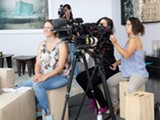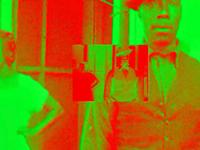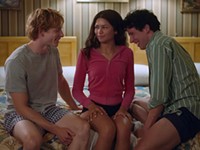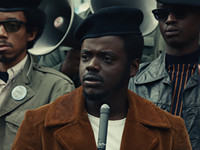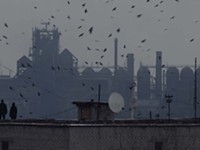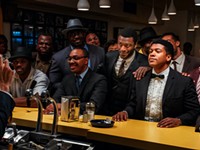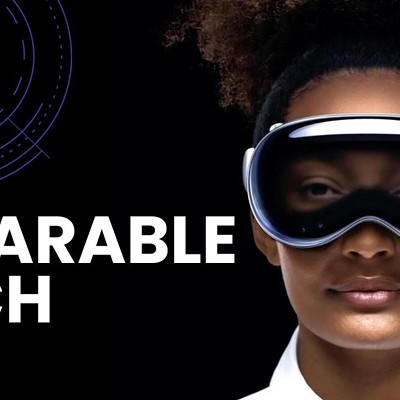[
{
"name": "500x250 Ad",
"insertPoint": "5",
"component": "15667920",
"parentWrapperClass": "",
"requiredCountToDisplay": "1"
}
]
The lack of opportunities for women in Hollywood, both in front of and behind the camera, isn’t a new issue by any stretch of the imagination. Women and minority filmmakers have been speaking up about inequality in the business of making movies for decades. But recently it seems as though the needle might finally be shifting, as the topic has gotten increased attention thanks to the #MeToo and Time’s Up movements as well as the long-overdue downfall of once powerful producer Harvey Weinstein.
Inspired by this changing atmosphere, as well as by her own winding journey to the director’s chair, filmmaker Amy Adrion decided to sit down with some of the women directors — from Ava DuVernay to Lena Dunham — who have inspired her over the years, talking with them about their own experiences navigating and finding success in a frequently hostile industry.
The result is the eye-opening, funny, often angering, but ultimately inspirational documentary “Half the Picture,” which will screen Tuesday, July 10, and Saturday, July 14, at the Little Theatre as part of the monthly One-Take documentary series.
Adrion will be in town for a discussion following Tuesday’s screening. Speaking with the filmmaker from her home in Los Angeles, CITY had the chance to talk with the director about crafting “a love letter to female excellence,” and why she’s hopeful that notoriously slow to learn Hollywood might finally be ready to take some important lessons to heart.
CITY: You were able to interview an amazing collection of women filmmakers for this film. How did you approach them, and what was their response when you told them about the movie you were making?
Amy Adrion: I was really pleasantly surprised. I think that we came along at the right time where women were open to speaking about these issues on camera. For a long time women and people in the business were extremely reluctant to speak about these issues — particularly on camera. And a lot of people still are; there's a lot of fear in the business. So much of your power as a director is the image you present to the world and you want to present an image that's confident and unflappable and strong and powerful and visionary. And talking about nonsense you had to deal with, or not having your work taken seriously, all of those things kind of chip away at the image that you want to present to the world. So I think there was a lot working against women being honest about their experiences in the business.
But I had worked with a couple of women directors, and I had some connection to some high profile women. Thankfully these are women who have been speaking about these issues for a long time. Catherine Hardwicke and Miranda July were our first two interviews. And just them willing to sit down with us on camera and talk candidly about their experiences opened the door to a lot of other women taking us seriously, because we had these really talented high profile women who had sat down with us. So we did our research and came into the interviews really well prepared.
And the women had good experiences in our interviews, so often the women we interviewed would say like, "Have you talked to Lena Dunham yet? Or have you talked to Mary Harron, or have you talked to Kasi Lemmons? I can put you in touch," and that was incredibly helpful. But it was definitely one foot in front of the other. I certainly didn't know when we started the film that we would be able to reach all the women that wound up being in the film. If I had known that, the process would have been much less stressful, but we just didn't know. You build one interview on the next, work hard, and hope for the best.
Being a woman in Hollywood, you’ve obviously had your own experiences and challenges navigating through the industry, but was there anything said by the women you interviewed that you were surprised to hear?
Yeah. I went into these interviews a little bit starstruck because the women we interviewed are women whose films made me want to be a filmmaker. I have so much admiration for the women we interview in the film. They are such rock stars, and so talented. I am just so impressed with them as artists, that I was really surprised to hear that they encountered so many of the challenges and roadblocks that I've encountered and that my friends have encountered, whether that be asking for opportunities or being shut down completely.
Jill Soloway talks about being a writer and a showrunner on "Six Feet Under." She had a very powerful position there and every season she would say to the network, "I want to direct an episode this season, I want to direct," and they kept telling her, “you're not ready, you're not ready.” And she was running the show! And you just think like, wow, she’s such a great writer and a great director, and even she had to fight to get that first opportunity.
There are so many stories that the women in the film share of submitting their first films to top tier festivals and getting rejected, submitting for grants and getting rejected, trying to get big actors to sign onto their films and getting rebuffed. All of the experiences that women directors face now, all of these women faced also. And I think I’d kind of assumed that because they're so talented, maybe they wouldn't have faced that stuff. But they did. They just figured out a way to not be discouraged and persevere and keep making their work.
In the film you interview Brenda Chapman, who talks a little about being taken off the Pixar film “Brave” as a director. Just a few days ago, Variety published a column by Cassandra Smolcic, a graphic designer who used to work at Pixar, where she writes about the culture of sexism at that studio. As you see these stories continuing to be spoken about publicly — and obviously in the wake of Harvey Weinstein, and the #MeToo movement — are you feeling hopeful that things are actually shifting in Hollywood?
I am hopeful. I'm hopeful and discouraged at the same time. I would say it's really discouraging — and this exists throughout our culture and in all different fields — that it takes 60 women speaking out publicly to bring down one powerful man. Women need to have a chorus of people stating their experiences for those experiences to be believed. And that is crazy. I think for so long when a woman spoke up, she was labeled as difficult or crazy or whatever the long list of pejoratives that have been used to silence and sideline women.
And I think Brenda Chapman encountered some of that when she was taken off "Brave," that she was difficult or she was indecisive or she didn't know what she wanted. And it's easy to disparage one individual, but when you hear story after story after story where women publicly come out and state, "this was my experience too" and "this was my experience," then finally people start to believe it. It's a shame that it requires so many women speaking out in order for them to be believed, though I am very encouraged that so many women are being so brave. But it does not come without a price. Those first people who spoke out about Harvey Weinstein, or look at what happened to Rose McGowan. I mean, she's been trashed in the media for a really long time.
But I am very grateful to them. And that was such a well-written essay by [Cassandra] about her experience working at Pixar. It really paints a picture of an environment that is at minimum not supportive of women, and seems more likely to be very damaging for women. And at a place like Pixar, the cultural cost is so high. They make hugely successful, hugely influential kids movies, and the representation of women in those movies, and which characters are featured versus which are the supporting players, when you see the culture of the company, you get a better understanding of the output that they make. And that's just so unfortunate because that's really influencing the next generation of American children, and what they're going to think about the world and about girls and boys and about men and women. Places like Pixar are extremely powerful.
Toward the end of the film Ava DuVernay talks about the “mighty tribe of women filmmakers” and the things that can be accomplished by working together. That seems to have been the mindset you had when making this film, focusing entirely on the women themselves. Was there any point where you were tempted to interview male directors or executives and kind of hold their feet to the fire and question them about their practices?
No, but that's a great question. I was really inspired by this other documentary called "The Punk Singer," which is about Kathleen Hanna from Le Tigre and Bikini Kill. She said in that film that she didn't want to have established male music critics from, you know, the New York Times or Rolling Stone on camera talking about why her music is valuable. She didn't want to cede that ground to quote unquote male authorities to legitimize her.
In our film, we could've asked Martin Scorsese to talk about why "Boys Don't Cry" is a masterpiece and how Kim Peirce is an incredible filmmaker. And I know that he feels that way and has said that publicly. But again, that puts the spotlight and the emphasis on these male directors who've already had decades of attention and a platform for their voice. Whereas these women directors, even though this is an issue that's been in the public for the past few years, I feel like their voices as the women at the center of this issue have not really been given the spotlight they deserve. So I really wanted to center the women directors themselves to talk about their own experiences and not have quote unquote male authorities legitimize them as filmmakers or artists.
And we could have interviewed executives in the industry or producers or agents and ask them, "why don't you hire more women directors?" But I felt like, first of all the people who are in the top positions of hiring are probably not going to sit down with me. And if they do, they're going to give me the company line of, “here's our diversity initiative, and here's the shadowing programs, and these are the efforts we're making to rectify this issue.” But I didn't feel like I would gain that much from sitting down with them. So we didn't even really pursue it.
You do such a great job throughout the film of walking the line between talking about these subjects that are angering and frustrating, but ultimately leaving the audience feeling inspired. When you were shaping the film, how did you make sure that positivity came through in the end?
Well, I went into each of these interviews with so much joy in my heart for the opportunity to sit down with these women and as I said, I'm just a huge fan of their work. So I think that energy was infused in the interviews and in the film itself. We certainly explore the challenges women directors face, but this is a love letter to women movie directors, to filmmaking, to female excellence, to making art. And that was always at the heart of the film. I'm not an investigative journalist. We use statistics in the film as much as is necessary to paint a picture of where we're at, but I never intended this to be a dry examination of the numbers, or an educational piece. I always wanted this to be a movie that’s a love letter to the women directors I admire. So I think that was always part of the film’s DNA, it was always the heart of the film; all of our collective love of movies and what these women have been able to achieve.
“Half the Picture” will screen Tuesday, July 10, at 7 p.m. and Saturday, July 14, at 3 p.m. $4-$9. thelittle.org
